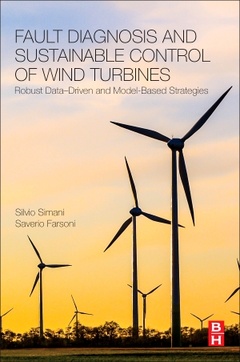Description
Fault Diagnosis and Sustainable Control of Wind Turbines
Robust Data-Driven and Model-Based Strategies
Authors: Simani Silvio, Farsoni Saverio
Language: English
Subjects for Fault Diagnosis and Sustainable Control of Wind Turbines:
116.98 €
In Print (Delivery period: 14 days).
Add to cartSupport: Print on demand
Description
/li>Contents
/li>Readership
/li>Biography
/li>Comment
/li>
Fault Diagnosis and Sustainable Control of Wind Turbines: Robust Data-Driven and Model-Based Strategies discusses the development of reliable and robust fault diagnosis and fault-tolerant (?sustainable?) control schemes by means of data-driven and model-based approaches. These strategies are able to cope with unknown nonlinear systems and noisy measurements. The book also discusses simpler solutions relying on data-driven and model-based methodologies, which are key when on-line implementations are considered for the proposed schemes. The book targets both professional engineers working in industry and researchers in academic and scientific institutions.
In order to improve the safety, reliability and efficiency of wind turbine systems, thus avoiding expensive unplanned maintenance, the accommodation of faults in their early occurrence is fundamental. To highlight the potential of the proposed methods in real applications, hardware?in?the?loop test facilities (representing realistic wind turbine systems) are considered to analyze the digital implementation of the designed solutions. The achieved results show that the developed schemes are able to maintain the desired performances, thus validating their reliability and viability in real-time implementations.
Different groups of readers?ranging from industrial engineers wishing to gain insight into the applications' potential of new fault diagnosis and sustainable control methods, to the academic control community looking for new problems to tackle?will find much to learn from this work.
Mechanical; Electrical and Power engineers working in industry and researchers in academic and scientific institutions wishing to gain insight into the applications potential of new fault diagnosis and sustainable control methods.
Saverio Farsoni was born in Mirandola (MO, Italy) in 1987. In 2012 He graduated (cum laude) in Informatics and Automation Engineering at the University of Ferrara with a M. Sc. thesis on simulations in bio–medical environments. Since 2013 he has been PhD student in Engineering Science and, together with his supervisor, Dr. Simani, he works on control systems, fuzzy logic, modelling and identification problems. In particular, his researches deal with fault diagnosis and fault tolerant control for eolic plants, and he published some conference papers about these issues
- Provides wind turbine models with varying complexity, as well as the solutions proposed and developed by the authors
- Addresses in detail the design, development and realistic implementation of fault diagnosis and fault tolerant control strategies for wind turbine systems
- Addresses the development of sustainable control solutions that, in general, do not require the introduction of further or redundant measurements
- Proposes active fault tolerant ('sustainable') solutions that are able to maintain the wind turbine working conditions with gracefully degraded performance before required maintenance can occur
- Presents full coverage of the diagnosis and fault tolerant control problem, starting from the modeling and identification and finishing with diagnosis and fault tolerant control approaches
- Provides MATLAB and Simulink codes for the solutions proposed




